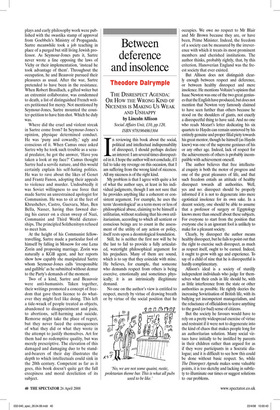Between deference and insolence
Theodore Dalrymple
THE DiSRESPECT AGENDA: OR HOW THE WRONG KiND OF NiCENESS iS MAKiNG US WEAK AND UNHAPPY by Lincoln Allison Social Affairs Unit, £10, pp.120, ISBN 9781904863304 In reviewing this book about the social, political and intellectual indispensability of disrespect, I should perhaps declare an interest: I am several times disrespected in it. I hope the author will not conclude, if I fail to take my revenge on this occasion, that I am suffering from the wrong kind of niceness. All my niceness is of the right kind.
My problem is that I agree with quite a lot of what the author says, at least in his individual judgments, though I am not sure that he provides anything like a coherent or consistent argument. For example, he uses the term ‘deontological’ as a term more or less of philosophical abuse, claiming to be himself a utilitarian, without realising that his own utilitarianism, according to which all sentient or conscious beings are to count in the assessment of the utility of any action or policy, itself rests upon a deontological foundation.
Still, he is neither the first nor will he be the last to fail to provide a fully articulated, watertight philosophical argument for his prejudices. Many of them are sound, which is to say that they coincide with mine. He believes, for example, that someone who demands respect from others is being coercive, emotionally and sometimes physically; it is an intrinsically illegitimate demand.
No one on the author’s view is entitled to respect, merely by virtue of drawing breath or by virtue of the social position that he occupies. We owe no respect to Mr Blair and Mr Brown because they are, or have been, Prime Minister. Indeed, the freedom of a society can be measured by the irreverence with which it treats its most prominent members and cherished institutions. The author thinks, probably rightly, that, by this criterion, Hanoverian England was the freest society that ever existed.
But Allison does not distinguish clearly enough between respect and deference, or between healthy disrespect and mere insolence. He mentions Voltaire’s opinion that Isaac Newton was one of the two great geniuses that the English have produced, but does not mention that Newton very famously claimed to have seen further than others because he stood on the shoulders of giants, not exactly a disrespectful thing to have said. And no one who reads Mozart’s letter dedicating his six quartets to Haydn can remain unmoved by his entirely genuine and proper filial piety towards his great mentor, though he himself (as Haydn knew) was one of the supreme geniuses of his or any other age. Indeed, lack of respect for the achievements of others is probably incompatible with achievement oneself.
The author believes that free intellectual enquiry is both the motor of progress and one of the great pleasures of life, and that such freedom entails an attitude of healthy disrespect towards all authorities. Well, yes and no: disrespect should be properly informed if it is not to degenerate into mere egotistical insolence for its own sake. In a decent society, one should be able to assume that a professor of surgery or Egyptology knows more than oneself about these subjects. For everyone to start from the position that everyone else is an ignorant fool is unlikely to make for a pleasant society.
Clearly, by disrespect the author means healthy disrespect, but he fails to point out that the right to exercise such disrespect, as much as respect itself, ought to be earned. Indeed, it ought to grow with age and experience. To say of a child of nine that he is disrespectful is hardly complimentary.
Allison’s ideal is a society of sturdily independent individuals who judge for themselves what their ends in life should be, with as little interference from the state or other authorities as possible. He rightly decries the increasing Sovietisation of British life, with its bullying yet incompetent managerialism, and the reluctance of officialdom to leave anything to the good (or bad) sense of citizens.
But the society he favours would have to rely on a pretty widespread exercise of virtue and restraint if it were not to degenerate into the kind of chaos that makes people long for an authoritarian solution. Many social virtues have initially to be instilled by parents in their children rather than argued for as if they were participants in a Socratic dialogue; and it is difficult to see how this could be done without basic respect. So, while The Disrespect Agenda makes some valuable points, it is too sketchy and lacking in subtlety to illuminate our times or suggest solutions to our problems.










































































 Previous page
Previous page